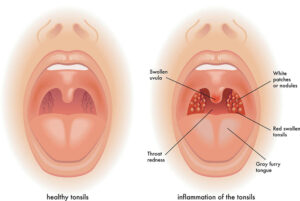Tonsillitis

Tonsillitis is an infection of your tonsils, two masses of tissue at the back of your throat.
Your tonsils act as filters, trapping germs that could otherwise enter your airways and cause infection. They also make antibodies to fight infection. But sometimes, they get overwhelmed by bacteria or viruses. This can make them swollen and inflamed.
Tonsillitis is common, especially in children. It can happen once in a while or come back again and again in a short period.
There are three types:
- Acute tonsillitis. These symptoms usually last 3 or 4 days but can last up to 2 weeks.
- Recurrent tonsillitis. This is when you get tonsillitis several times in a year.
- Chronic tonsillitis. This is when you have a long-term tonsil infection
Most cases of tonsillitis are caused by infection with a common virus, but bacterial infections also may cause tonsillitis.
Symptoms:
Throat pain or tenderness, Fever, Red tonsils, A white or yellow coating on your tonsils, Painful blisters or ulcers on your throat, Headache, Loss of appetite, Ear pain, Trouble swallowing, Swollen glands in your neck Fever and chills, Bad breath, A scratchy or muffled voice, Stiff neck


